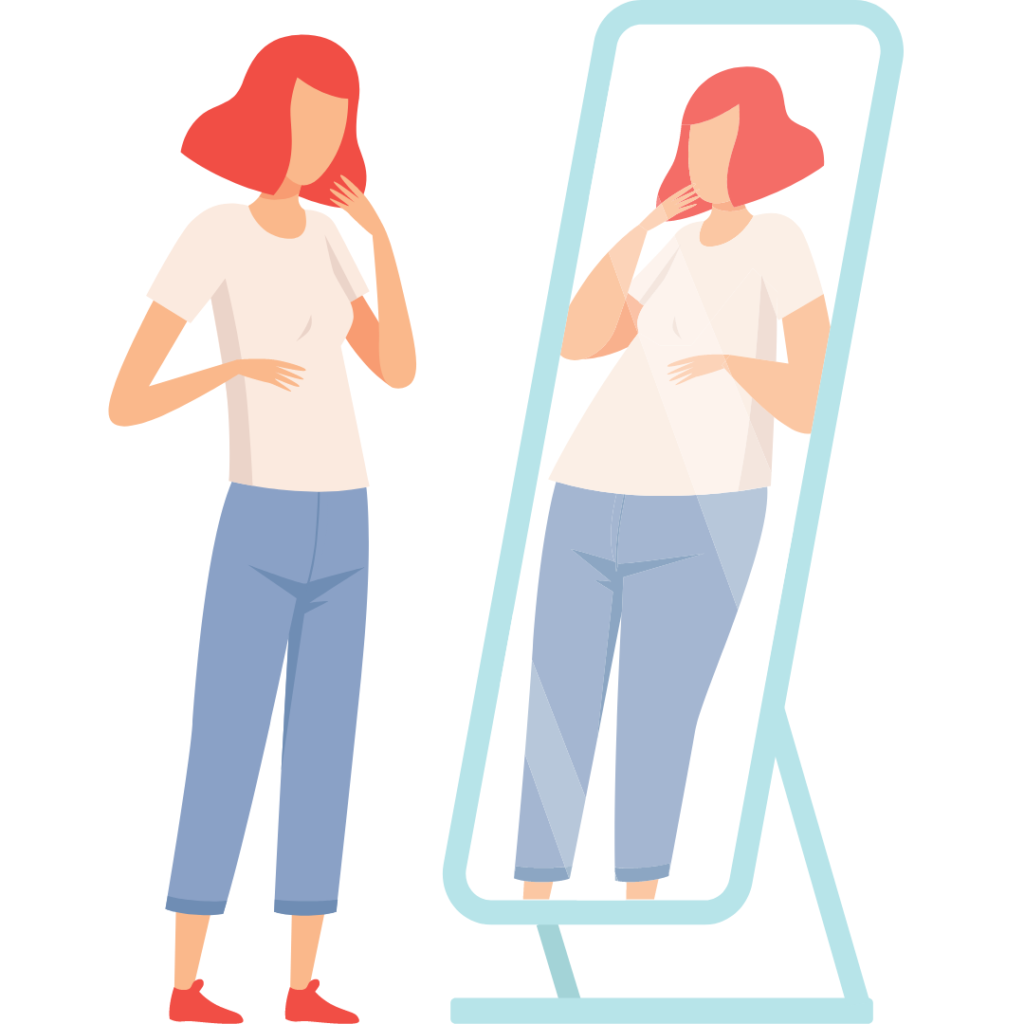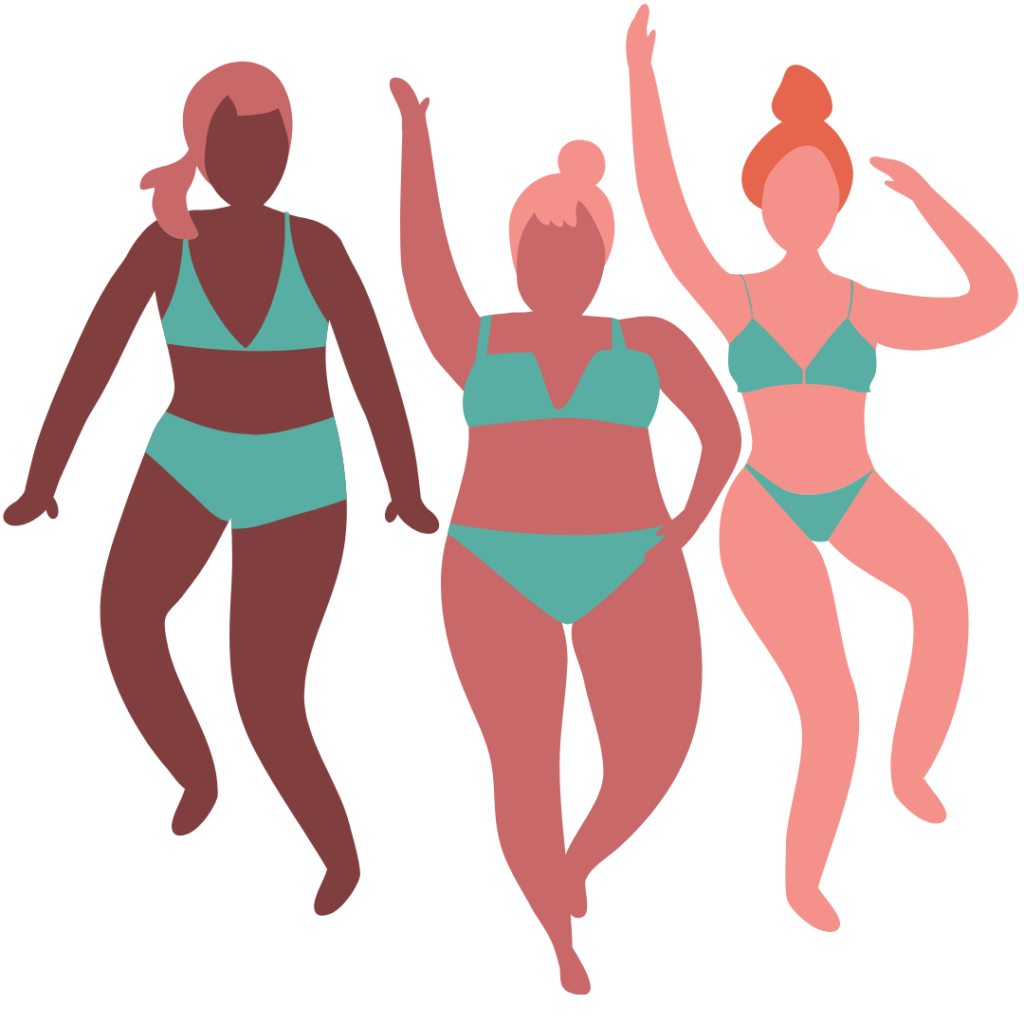This blog is part of The Future Is Feminist campaign. It discusses the impact that the media has on young women, ideas of what happens if young people don’t conform to beauty standards, and who is responsible for making a difference.
What is body image?
Body image is the way that we think and feel about our bodies. Body image can be influenced by lots of things such as family, friends, culture, media, and your past experiences.
The media, such as TV and social media platforms are often seen as of the biggest causes of poor body image due to the encouragement and publication of unrealistic and unachievable body types after lots of editing.
It can be hard to get your head around the fact that the people we see on the big screen, our phones, or in magazines are not a true representation of what we look like in real life. Even if we do understand this, it can still be hard to not compare yourself to the images and narrative we see every day!
What do young people in Cardiff think about beauty standards & the media?
This blog shares what the TheSprout asked to young people, and some of the Young Creators group from Cardiff Youth Service had to say. Here’s what we asked:
- How does TV & social media influence body image?
- What makes people think they need to look a certain way?
- What happens if women don’t conform to beauty standards?
- How can we support women and promote positive body image/self-love?
- Who is responsible for this?
How does TV & social media influence body image, and what makes people think they need to look a certain way?
The role of editing in the media was discussed as one of the main ways that TV and social media can influence body image issues among young people:
‘Photos are often edited. People are wanting to look like other ‘people’, when in reality it’s actually impossible’ – AR
‘I think it is because loads of celebrities do photoshop and stuff like that and it makes people think that they need to look like that or do that too’ – Ava
‘The media promote unrealistic beauty standards such as hourglass figures and thigh gaps. Quite often, images of models are edited to portray the ideal body, but it’s not real’ – Hal
Promoting unrealistic beauty standards in the media go beyond editing photos, but this is just one way to pressure people into feeling that they have to look and behave a certain way:
‘There are too many shows on TV about looking good like makeup competitions and fitness etc. These put pressure on people to behave in a certain way to supplement their looks’ – Tomos
‘The media promotes unhealthy habits and diet culture which is harmful for young people as they think that they should blindly follow what happens’ – Anonymous
‘We are brainwashed into thinking that they have to look like models when the models don’t even look like models! – Hallie

One young person went further to use Marvel Cinematic Universe as an example of how the media affects body image for everyone, leading to poorer mental health:
Hypersexualising men & women – especially in my fav MCU movies, by giving steroids for muscles etc. Although MCU gains a lot of MCU fans like me, they end up contributing to worsening the mental health of people who don’t critically analyse media
A possible reason for this may be because the media prioritise profit over mental health and accurate representation of peoples bodies:
‘TV’s main source of income is body and makeup programs’ – Logan
What happens if women don’t conform to beauty standards?
There was a large consensus from young people that women who don’t conform to societal beauty standards may be shamed, mocked or ridiculed by others and made to feel bad about their bodies. This can lead to low self esteem as ‘looking after your appearance based on society’s standards’ is seen as the epitome of female beauty:
‘Women see photos on social media and think they need to meet those standards and that leads to other women shaming them and making them feel bad about their looks and bodies’ – Ava
‘Those who try to break the cycle and not conform to society’s ideal body or looks can sometimes be seen as ‘less than’ by both other women and men’ – Anonymous
‘Women who don’t perform to body image standards are seen as less feminine, almost like femininity is defined by this unrealistic expectation of female beauty’ – Hal
‘Members of society, notably men, begin to have astronomical expectations of women which leads to scenarios such as abuse when women do not meet the ‘requirements” – Tomos

One young person suggested that there are consequences for both conforming and not conforming to beauty standards:
‘Women can be bullied, shamed and abused for not conforming to beauty standards, but if they do, they are often over-sexualised. Women can’t win!’ – Hallie
Another young person suggested that any consequences from not conforming are due to society, rather than an internal problem. For him, true beauty is not external or based on typical beauty standards for women:
‘It’s not the end of the world, although others will think it is. There is no exact definition of beauty. Beauty lies in the heart, the mind and the character’ – Eshaan
How can we support women and promote positive body image and self-love, and who is responsible for this?
One young person suggested that the media doesn’t provide an honest representation of what real people look like, or how even how they behave in society.
‘In almost every film, the ‘damsel in distress’ is a blonde-haired girl with a size 8 waist and the hero has a six pack and a perfect, clean-shaven face. We need more mis-matches, like a fat cat woman and a male in distress’ – Tomos
Another young person posed a suggestion about what social media platforms could do to help people understand the differences between reality and fake, edited images of people:
‘Would it be so radical for social media platforms such as Instagram should have labels on posts identifying which have been edited? Sometimes, radical ideas are needed for change’ – Halyna

It was also suggested that governments have some responsibility to create policy to tackle unhealthy beauty standards:
‘Governments are responsible for creating policy to make meaningful change across the media to ensure that unrealistic beauty standards are not shown’ – Anonymous
Educational institutions, for examples, schools, colleges, sixth forms and universities could help to educate young people about body image, beauty standards, self-esteem, and the difference between what is real and fake:
Educational institutions could help young people to understand the dangers of social media and media platforms to help people know what’s fake! – Anonymous
People in society like you and me also have a responsibility to treat others with kindness and respect, and not compare each other to these unachievable high standards:
‘By not shaming women for their looks and other things they can not control’ – Ava
Related Information
To find out more about the campaign group and to read more content from The Future Is Feminist campaign, click here.





